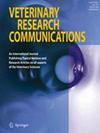Measuring the impact of dietary supplementation with citrus or cucumber extract on chicken gut microbiota using 16s rRNA gene sequencing.
IF 1.8
3区 农林科学
Q2 VETERINARY SCIENCES
Veterinary Research Communications
Pub Date : 2024-08-01
Epub Date: 2024-05-23
DOI:10.1007/s11259-024-10417-w
引用次数: 0
Abstract
This study investigated the effects of dietary supplements, citrus (CTS) and cucumber (CMB), on the jejunum and cecum microbiota of 14- and 28-days old broiler chickens to evaluate their impact on the gut health and assess their role as alternatives to antibiotic growth promoters (ABGPs). 16SrRNA gene sequencing revealed the overall bacterial microbiota composition was significantly affected by the gut site (p?

利用 16s rRNA 基因测序法测量膳食中补充柑橘或黄瓜提取物对鸡肠道微生物群的影响。
本研究调查了膳食补充剂柑橘(CTS)和黄瓜(CMB)对14日龄和28日龄肉鸡空肠和盲肠微生物群的影响,以评估它们对肠道健康的影响,并评估它们作为抗生素生长促进剂(ABGPs)替代品的作用。16SrRNA 基因测序显示,细菌微生物群的整体组成受肠道部位的影响很大(p?
本文章由计算机程序翻译,如有差异,请以英文原文为准。
求助全文
约1分钟内获得全文
求助全文
来源期刊

Veterinary Research Communications
农林科学-兽医学
CiteScore
2.50
自引率
0.00%
发文量
173
审稿时长
3 months
期刊介绍:
Veterinary Research Communications publishes fully refereed research articles and topical reviews on all aspects of the veterinary sciences. Interdisciplinary articles are particularly encouraged, as are well argued reviews, even if they are somewhat controversial.
The journal is an appropriate medium in which to publish new methods, newly described diseases and new pathological findings, as these are applied to animals. The material should be of international rather than local interest. As it deliberately seeks a wide coverage, Veterinary Research Communications provides its readers with a means of keeping abreast of current developments in the entire field of veterinary science.
 求助内容:
求助内容: 应助结果提醒方式:
应助结果提醒方式:


